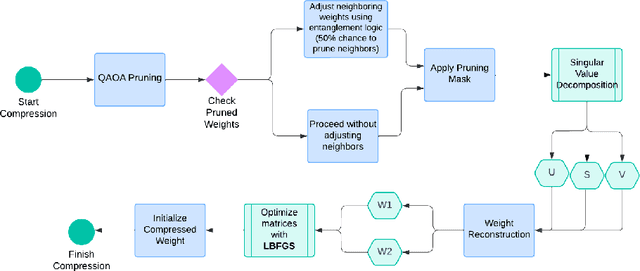Jonathan Pei
QIANets: Quantum-Integrated Adaptive Networks for Reduced Latency and Improved Inference Times in CNN Models
Oct 14, 2024

Abstract:Convolutional neural networks (CNNs) have made significant advances in computer vision tasks, yet their high inference times and latency often limit real-world applicability. While model compression techniques have gained popularity as solutions, they often overlook the critical balance between low latency and uncompromised accuracy. By harnessing quantum-inspired pruning, tensor decomposition, and annealing-based matrix factorization - three quantum-inspired concepts - we introduce QIANets: a novel approach of redesigning the traditional GoogLeNet, DenseNet, and ResNet-18 model architectures to process more parameters and computations whilst maintaining low inference times. Despite experimental limitations, the method was tested and evaluated, demonstrating reductions in inference times, along with effective accuracy preservations.
SWAG: Storytelling With Action Guidance
Feb 05, 2024



Abstract:Automated long-form story generation typically employs long-context large language models (LLMs) for one-shot creation, which can produce cohesive but not necessarily engaging content. We introduce Storytelling With Action Guidance (SWAG), a novel approach to storytelling with LLMs. Our approach reduces story writing to a search problem through a two-model feedback loop: one LLM generates story content, and another auxiliary LLM is used to choose the next best "action" to steer the story's future direction. Our results show that SWAG can substantially outperform previous end-to-end story generation techniques when evaluated by GPT-4 and through human evaluation, and our SWAG pipeline using only open-source models surpasses GPT-3.5-Turbo.
PREADD: Prefix-Adaptive Decoding for Controlled Text Generation
Jul 06, 2023Abstract:We propose Prefix-Adaptive Decoding (PREADD), a flexible method for controlled text generation. Unlike existing methods that use auxiliary expert models to control for attributes, PREADD does not require an external model, instead relying on linearly combining output logits from multiple prompts. Specifically, PREADD contrasts the output logits generated using a raw prompt against those generated using a prefix-prepended prompt, enabling both positive and negative control with respect to any attribute encapsulated by the prefix. We evaluate PREADD on three tasks -- toxic output mitigation, gender bias reduction, and sentiment control -- and find that PREADD outperforms not only prompting baselines, but also an auxiliary-expert control method, by 12% or more in relative gain on our main metrics for each task.
 Add to Chrome
Add to Chrome Add to Firefox
Add to Firefox Add to Edge
Add to Edge